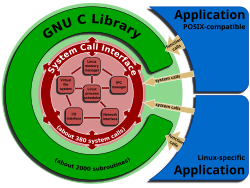| GIO | |
|---|---|
| Developer | The GNOME Project |
| Written in | C |
| Type | System library |
| License | GNU Lesser General Public License |
| Website | docs |


GIO (Gnome Input/Output) is a library, designed to present programmers with a modern and usable interface to a virtual file system. It allows applications to access local and remote files with a single consistent API, which was designed "to overcome the shortcomings of GnomeVFS" and be "so good that developers prefer it over raw POSIX calls." [1]
Contents
GIO serves as low-level system library for the GNOME Shell/GNOME/GTK software stack and is being developed by The GNOME Project. It is maintained as a separate library, libgio-2.0, but it is bundled with GLib. GIO is free and open-source software released under the GNU Lesser General Public License.